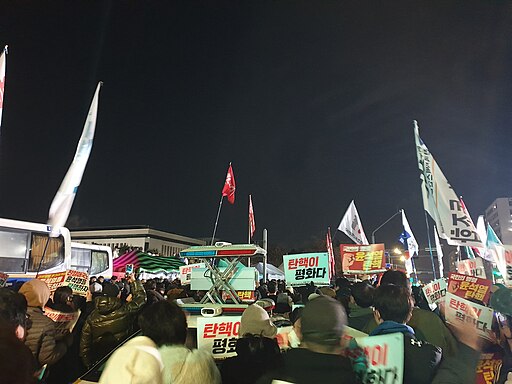What the US can learn from South Koreans who stopped an Authoritarian Power-Grab

```html
Six Hours to Save Democracy: Lessons from South Korea's Defeated Coup
A Nation Mobilized: Martial Law Reversed in a Single Night
Imagine a world where a president declares martial law, only to see it overturned by the people in just six hours. This isn't a hypothetical scenario; it's exactly what happened in South Korea in December 2024. President Yoon Suk Yeol's attempt at a self-coup, citing the usual bogeymen of "anti-state forces," was met with swift and decisive resistance from the South Korean people, offering a powerful example of how quickly a determined citizenry can defend democracy.
While some American politicians offered tepid responses to recent challenges to democratic norms, South Koreans were scaling fences and blocking tanks. This dramatic contrast highlights the potential of a mobilized populace and offers vital lessons for safeguarding democracy in the face of executive overreach.
Lightning Fast Action: Citizens Race Against the Clock
From the moment martial law was declared, South Koreans sprang into action. Fueled by social media and live streams, over 16,000 people converged on the National Assembly, outpacing the arrival of martial law forces. Taxi drivers refused fares, the elderly offered themselves as human shields, and young people stood defiantly before tanks, documenting the events in real time. This rapid response, born of instinct and a shared understanding of the stakes, prevented the consolidation of power by the coup plotters.
Inside the Assembly, parliamentary aides and staffers barricaded entrances and protected vital infrastructure, holding off the martial law forces until the National Assembly could formally demand the lifting of martial law. Their courage and ingenuity played a crucial role in the coup's swift demise.
Winning Hearts and Minds: Encouraging Defections Within Security Forces
Remarkably, the martial law forces themselves exhibited signs of reluctance. Poor planning and a lack of clear justification for the coup contributed to their hesitation. The younger generation of military personnel, raised in a democratic society, displayed a civic consciousness that made them less receptive to unlawful orders.
Citizens actively encouraged defections, pleading with soldiers to disobey illegal commands. Former special forces veterans leveraged their shared military background, while lawyers' groups provided legal justifications for resisting the coup. This multi-pronged approach aimed at undermining the coup from within proved remarkably effective.
Staying Vigilant: Guarding Against a Resurgence of Authoritarianism
Even after the initial victory, the threat remained. President Yoon reportedly contemplated further attempts to seize power, highlighting the need for constant vigilance. Citizens continued to protest, demanding the president's arrest and impeachment. Lawmakers remained in the Assembly, fearing abduction, and civil society groups prepared for the possibility of another power grab.
This sustained pressure, combined with the ongoing threat of mass mobilization, ultimately led to the president's detention and indictment.
The Power of the People: Festive Resistance and Long-Term Vision
The South Korean protests were not just acts of defiance; they were celebrations of democracy. K-pop light sticks replaced traditional candles, creating a vibrant and engaging atmosphere that drew in younger generations. Food sharing and musical performances transformed the protests into festivals, fostering a sense of community and shared purpose.
But the movement's aims extended beyond the immediate crisis. Recognizing the need for deeper societal change, civil society groups formed a coalition to push for comprehensive reforms, envisioning a new republic built on public discourse and democratic principles.
The South Korean experience offers a profound lesson: democracy is not a given; it's a continuous struggle that requires constant vigilance, swift action, and the unwavering commitment of its citizens. As Jungmin Choi, a campaigner at World Without War, observes, the South Korean people understand that true change requires more than simply shifting political power. It demands a fundamental transformation of society itself.